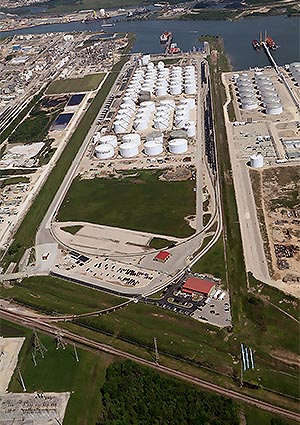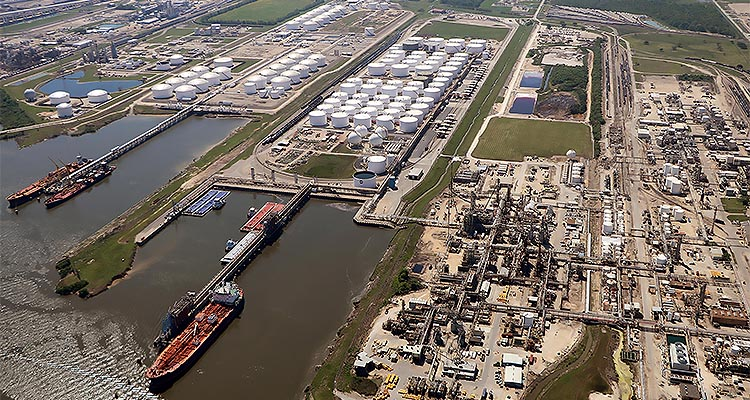Intercontinental Terminals Company (ITC) is growing with sustainability and safety in mind
Intercontinental Terminals Company (ITC) is a premier terminal services company based in Texas on the Houston Ship Channel. The company is strategically positioned in key market hubs across the globe. Priding itself on customer service, ITC provides storage and logistics services for customers operating within the global petrochemical and petroleum products market.
Having started as a joint venture between a private owner and Mitsui & Co Ltd in 1972, ITC has grown into a major storage and service provider during its 50-year tenure. Today, ITC is wholly owned by Mitsui & Co USA, Ltd and manages four facilities: Deer Park and Pasadena in Texas, Anchorage Terminal in Louisiana, and ITC-Rubis Terminal in Antwerp, Belgium, which is a joint venture between ITC and Rubis Terminal Infra offering storage and transportation services for petrochemical liquids and liquified gases.
World-class operations
Deer Park and Pasadena sit within Houston’s Ship Channel, whereas the Anchorage Terminal is in Port Allen, Louisiana occupying a unique position on the

Mississippi River. With a combined operating capacity of just under 20 million barrels across the four sites, ITC is one of the world’s largest storers of petrochemicals including methanol and aromatics.
We last spoke with Brent Weber, CEO and President of ITC, around 18 months ago, so the team at Energy, Oil & Gas are keen to catch up with Brent to learn about the company’s latest developments. “ITC was founded in 1972 in Deer Park, Texas, and the business has grown substantially since then,” he opens. “We are a global storage and terminal services company with two large terminals in Texas, and a third-party operator of a small terminal in Port Allen, Louisiana, as well as joint venture partners of ITC Rubis, a world-class petrochemical terminal in Antwerp, Belgium.
Capacity expansion
“In total, we boast close to 20 million barrels of storage on the Houston Ship Channel, making us one of the largest terminals on the channel. With close to 12 million barrels of storage capacity, Deer Park is one of the largest petrochemical facilities in the world. The terminal stores around two million barrels of methanol and a further two million barrels of storage for benzene, toluene, and xylene (BTX) compounds. We store a variety of acrylates, monomers such as vinyl acetate monomer (VAM), as well as solvents for many of the large chemical complexes in our surrounding areas. We also have a significant chunk of business in base oils and lubricants for several customers across a variety of industries.
“At our Pasadena terminal, we primarily store finished petroleum products like naphtha, finished gasoline, diesel, and jet fuel. Overall, our portfolio of capabilities reflects our broad spectrum of experience. We’re starting to see market trends for biofuels, and we’re actively pursuing some green products to further diversify our portfolio.
“At our Pasadena terminal, for instance, we’re exploring ethanol storage, and storage for sustainable products such as sustainable aviation fuel (SAF) and other biofuels,” Brent suggests. “Pasadena now has over seven million barrels of storage and while we have the potential to repurpose some of our storage tanks, we also have expansion capacity to build new tanks for these sustainable fuels.
“We’re currently constructing eight new tanks at Pasadena, which will increase the site’s storage capacity to over eight million barrels. We can expand our Deer Park terminal by approximately two million barrels, and our Pasadena site by an additional four million barrels. We’re planning to start construction of a new 1.5-million-barrel tank farm at Deer Park later this year. At ITC Rubis, a new tank pit is in construction and will come into service in 2025. We have capability and plans to build two additional tank pits in the future at ITC Rubis. In addition, ITC continues looking into acquisitions as well as greenfield and brownfield opportunities in the Gulf Coast region and across Europe.
“After building several new tanks, we’re confident in our ability to undertake further expansion projects. Although the storage requirements vary based on the product being stored, most of our products are stored in internal floating roof tanks. Some products need specialty designs, so we can also build non-floating roof, low pressure, and high-pressure storage tanks. Older tanks can also be converted from gasoline storage to petrochemical or lubricant storage as and when needed.”
Enhancing efficiency
 ITC prides itself on delivering the best possible service. “The entire company is focused on customer service, and our wonderful employees truly embrace customer care,” Brent elaborates. “We lease storage tanks to customers, providing all modes of transportation for the products: vessel, barge, rail car, tank truck, and pipeline system connections. We also offer pipeline connectivity, marine services, and land traffic services such as rail, truck, and iso-container.
ITC prides itself on delivering the best possible service. “The entire company is focused on customer service, and our wonderful employees truly embrace customer care,” Brent elaborates. “We lease storage tanks to customers, providing all modes of transportation for the products: vessel, barge, rail car, tank truck, and pipeline system connections. We also offer pipeline connectivity, marine services, and land traffic services such as rail, truck, and iso-container.
“At Deer Park, we operate 15 docks, with most tanks connected to multiple docks within the terminal, which gives us a competitive advantage on the marine side of the business as we are particularly efficient with our customers’ marine traffic. At Pasadena, on the other hand, we have nine docks and the ability to pump at high rates, meaning we’re quickly becoming one of the most efficient terminals on the Houston Ship Canal for finished petroleum products.
“At its core, ITC connects products to consumers. We are a vital component of our customers’ supply chains and distribution systems, and it is therefore our mission to store and move our customers’ products as safely and efficiently as possible. We’re increasingly using technology to track our processes and improve our efficiency.
“We use automation in the terminals to enhance safety alongside efficiency. Last year, we conducted a study at Pasadena to improve and reduce the time between calling a vessel and starting the pump operations, with the goal of getting vessels in and out of our docks as efficiently as possible without compromising on service. Our goal is to begin pumping within four hours, which is one of the best statistics on the Houston Ship Canal. Docks and marine efficiency continue to be our focus in terms of using technology to drive efficiency.
“We’re using AI in our rail yards to allow the switching crews to move the same number of cars with less moves, which is good for the locomotive, lowers emissions, and acts as a great risk management tool. We launched an internal communications app last year and we’re now starting to explore automated digital platforms for our customers that would send customers information about the status of their vessels and equipment.”
As our conversation ends, Brent considers what’s next for ITC. “2024 is an important year for us; we are on a growth spurt with multiple expansion projects underway and the potential commission of new additional tanks at Deer Park,” he says. “However, we constantly prioritize safety, and we’re currently pursuing VPP OSHA Star recognition via the OSHA Challenge Program. Under this program, the entire team is working to continuously improve our safety credentials ahead of OSHA’s comprehensive audit.
“Further afield, our goal is to have both the Pasadena and Deer Park terminals built to full capacity with 22 million barrels within the next five years, and we also hope to be a VPP OSHA Star site in the same timeframe,” Brent concludes. “We’ll keep expanding and hopefully have more projects underway, but we’re aiming to be recognized as leaders in our industry for technology, automation, and digitization.”
